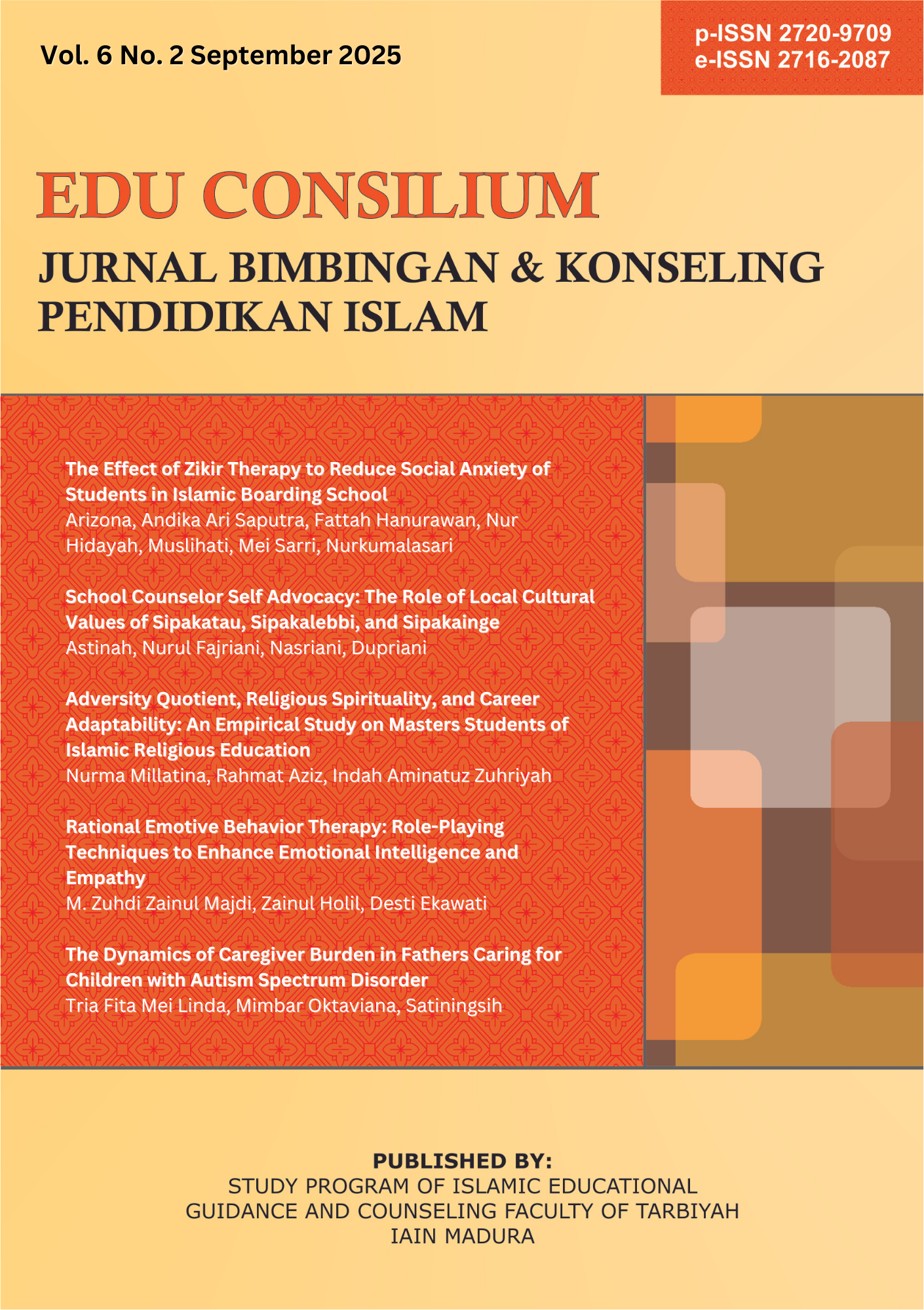The Dynamics of Caregiver Burden in Fathers Caring for Children with Autism Spectrum Disorder
 Abstract views: 231
,
Abstract views: 231
,
 PDF downloads: 258
PDF downloads: 258
Abstract
Autism spectrum disorder is a neurodevelopmental condition that affects an individual's ability to engage in social interactions, communicate effectively, and display repetitive behaviors. Children with this condition require intensive and continuous care, which often leads to burdens for parents in physical, psychological, social, and financial aspects. Although caregiving burdens are commonly associated with mothers, fathers also face complex challenges in daily caregiving roles. This study aims to explore the dynamics of caregiving burden experienced by fathers of children with this condition. A qualitative method with a phenomenological approach was used to understand the subjective experiences of five fathers selected through purposive sampling. Data were collected through in-depth interviews and observations, then analyzed using Interpretative Phenomenological Analysis (IPA). The findings revealed that fathers experienced caregiving burdens across physical, psychological, social, and financial domains. Participants also employed coping strategies such as accepting the child’s condition and managing emotions adaptively. Support from spouses and families played an important role in alleviating these burdens. These findings highlight the importance of acknowledging the father’s role in caregiving and the need for comprehensive support for both parents.
Downloads
References
ALBusaidi, A. M. S., ALMasroori, S. A. S., Awladthani, B. M. S., ALKhaldi, S. A., Al Alawi, N., & Al Salmani, A. A. (2022). Quality of life and coping strategies used by parents of children with autism spectrum disorder in Oman. Autism and Developmental Language Impairments, 7. https://doi.org/10.1177/23969415221142262
Alnazly, E. K., & Abojedi, A. (2019). Psychological distress and perceived burden in caregivers of persons with autism spectrum disorder. Perspectives in Psychiatric Care, 55(3), 501–508. https://doi.org/10.1111/ppc.12356
Ariyanti, R. D., & Nurrahima, A. (2021). Hubungan Caregiver Burden dengan Kualitas Hidup Caregiver Anak Tunagrahita. Jurnal Ilmu Keperawatan Anak, 4(2). https://doi.org/10.32584/jika.v4i2.1282
Asish, Vikas, & Manpreet. (2020). Fathers as care givers of children with autism spectrum disorder : a review. 8(1). https://doi.org/10.25215/0801.024
Astati, S., Basith, A., & Kamaruddin. (2024). Penerimaan Orang Tua Terhadap Anak Berkebutuhan Khsusu Di Uld-Pt Kota Singkawang. Journal of Educational Review and Research, 7(1), 25–33.
Camilleri, L. J. (2022). Exploring the Lived Experiences of Fathers of Children on the Autism Spectrum: A Narrative Inquiry. SAGE Open, 12(2). https://doi.org/10.1177/21582440221089927
Creswell, J. W., & Creswell, J. D. (2018). Research Design Qualitative, Quantitative, and Mixed Methods Approaches. In Sage Publications (fifth edit). https://doi.org/10.4324/9780429469237-3
Davy, G., Barbaro, J., Unwin, K., Clark, M., Jellett, R., Date, P., Muniandy, M., & Dissanayake, C. (2024). Leisure, community, workforce participation and quality of life in primary and secondary caregivers of autistic children. Autism Research, 17(4), 799–811. https://doi.org/10.1002/aur.3113
Dückert, S., Gewohn, P., König, H., Schöttle, D., Konnopka, A., Rahlff, P., Vogeley, K., Schulz, H., David, N., & Peth, J. (2023). Multidimensional Burden on Family Caregivers of Adults with Autism Spectrum Disorder: a Scoping Review. Review Journal of Autism and Developmental Disorders. https://doi.org/10.1007/s40489-023-00414-1
George-Levi, S., Laslo-Roth, R., & Ben Yaakov, L. (2023). Vulnerability to loneliness among fathers of children with autism spectrum disorder: The role of interpersonal and familial resources. Family Process, 63(1), 364–378. https://doi.org/10.1111/famp.12877
Hanurawan, F. (2016). Metode Penelitian Kualitatif Untuk Ilmu Psikologi (1st ed.). PT Raja Grafindo Persada.
Hasan, M., Harahap, T. K., Hasibuan, S., Rodliyah, L., Thalhah, S. Z., Rakhman, C. V., Ratnanigsih, P. W., Inanna, Mattunruang, A., Herman, Nursaeni, Yusriani, Nahriana, Silalahi, D. E., Hasyim, S. H., Rahmat, A., Ulfah, Y. F., & Arisah, N. (2022). Metode penelitian Kualitatif (edisi pertama). Tahta Media Group.
Herdiansyah, H. (2010). Metodologi Penelitian Kualitatif untuk ilmu-ilmu sosial. Salemba Humanika.
Höfer, J., Hoffmann, F., Dörks, M., Kamp-Becker, I., Küpper, C., Poustka, L., Roepke, S., Roessner, V., Stroth, S., Wolff, N., & Bachmann, C. J. (2022). Health Services Use and Costs in Individuals with Autism Spectrum Disorder in Germany: Results from a Survey in ASD Outpatient Clinics. Journal of Autism and Developmental Disorders, 52(2), 540–552. https://doi.org/10.1007/s10803-021-04955-4
Indiyani, A., Setyawan, D. A., & Abida, L. L. (2024). Hubungan Antara Dukungan Keluarga Dengan Kemampuan Pragmatik Anak Autism Spectrum Disorder (ASD) di Kota Sragen. 2, 857–866.
Insani, M. F., Rusmana, A., & Hakim, Z. (2021). Kecemasan Orangtua Terhadap Masa Depan Anak Penyandang Disabilitas Intelektual Di Slb C Bina Asih Cianjur. Jurnal Ilmiah Rehabilitasi Sosial (Rehsos), 3(1), 40–57. https://doi.org/10.31595/rehsos.v3i1.377
Iovino, E. A., Caemmerer, J., & Chafouleas, S. M. (2020). Pychological distress and burden among family caregivers of children with and without developmental disabilites six months into the covid 19 pandemic. Research in Developmental Disabilities, 114, 103983. https://doi.org/10.1016/j.ridd.2021.103983
Kahija, Y. La. (2017). Penelitian Fenomenologis (Jalan Memahami Pengalaman Hidup). Yogyakarta. Penerbit : PT Kanisius.
Khoirunnisa, Aquino, A., Parestorian, P. H., & Kurniawan, K. (2023). Strategi Coping Stres Orang Tua yang Memiliki Anak Berkebutuhan Khusus: A Scoping Review. Jurnal Keperawatan Jiwa, 11(1), 110–120. http://ejournal.umm.ac.id/index.php/keperawatan/issue/view
Latif, M. H. A., Ismail, W. S. W., Manaf, M. R. A., & Taib, N. I. A. (2023). Factors Influencing Despair, Self-blame, and Acceptance Among Parents of Children with Autism Spectrum Disorder (ASD): A Malaysian Perspective. Journal of Autism and Developmental Disorders, 2067–2074. https://doi.org/10.1007/s10803-023-06155-8
Lazarus, R. S., & Folkman, S. (1984). Stress, Apprasial, and Coping. Springer Publishing.
Lien, K., Lashewicz, B., Mitchell, J., & Boettcher, N. (2020). Blending Traditional and Nurturing Fathering: Fathers of Children With Autism Managing Work and Family. Family Relations, 70(1), 264–281. https://doi.org/10.1111/fare.12472
Liu, S., Wu, D., Li, J., & Yin, H. (2025). Latent profile analysis of parental burnout among parents of children with and without autism spectrum disorder. Frontiers in Psychology, 07. https://doi.org/10.3389/fpsyg.2025.1581321
Lovell, B., Elder, G. J., & Wetherell, M. A. (2021). Sleep disturbances and physical health problems in caregivers of children with ASD. Research in Developmental Disabilities, 113, 1–8. https://doi.org/10.1016/j.ridd.2021.103932
Marcinechová, D., Záhorcová, L., & Lohazerová, K. (2023). Self-forgiveness, Guilt, Shame, and Parental Stress among Parents of Children with Autism Spectrum Disorder. Current Psychology, 43(3), 2277–2292. https://doi.org/10.1007/s12144-023-04476-6
Marsack-Topolewski, C. N. (2023). Fathers of Adult Children with Autism: Examination of Caregiver Burden, Social Support, and Quality of Life. Journal of Child and Family Studies, 32(11), 3515–3525. https://doi.org/10.1007/s10826-023-02673-2
Moleong, L. J. (2016). Metodologi Penelitian Kualitatif (Edisi revisi). PT Remaja Rosdakarya.
Nida, F. L. K. (2021). Kontribusi Muhasabah dalam Mengembangkan Resiliensi Pada Orang Tua Anak Berkebutuhan Khusus. Journal An-Nafs: Kajian Penelitian Psikologi, 6(2), 244–262. https://doi.org/10.33367/psi.v6i2.1715
Nurlaila, A., Fikrie, & Dicky Listin Quarta. (2024). Hubungan Caregiver Burden dengan Kualitas Relasi Orang Tua-Anak pada Orang Tua yang Memiliki Anak Autisme. Jurnal Psikologi, 1(4), 17. https://doi.org/10.47134/pjp.v1i4.2979
Rudelli, N., Straccia, C., & Petitpierre, G. (2021). Fathers of children with autism spectrum disorder: Their perceptions of paternal role a predictor of caregiving satisfaction, self-efficacy and burden. Research in Autism Spectrum Disorders, 83. https://doi.org/10.1016/j.rasd.2021.101744
Salari, N., Fatahi, B., Fatahian, R., Mohammadi, P., Rahmani, A., Darvishi, N., Keivan, M., Shohaimi, S., & Mohammadi, M. (2022). Global prevalence of congenital anencephaly: a comprehensive systematic review and meta-analysis. Reproductive Health, 19(1), 201. https://doi.org/10.1186/s12978-022-01509-4
Smith, J.A ., Flower, P., & Larkin, M. (2009). Interpretative Phenomenological Analysis: Theory, Method and Research . Qualitative Research in Psychology, 6(4), 346–347. https://doi.org/10.1080/14780880903340091
Stefanni, D. M. (2024). Wamenkes Ungkap 2,4 Juta Anak di Indonesia Idap Autisme. DetikHealth. https://health.detik.com/berita-detikhealth/d-7336606/wamenkes-ungkap-2-4-juta-anak-di-indonesia-idap-autisme
Sugiyono. (2023). Metode Penelitian Kuantitatif Kualitatif Dan R&D. In ALFABETA (Vol. 11, Issue 1).
Syafiq, M., Setyawan, D. A., & Tirtawati, D. (2025). Pengaruh Lingkungan dan Dukungan Keluarga Terhadap Kemampuan Interaksi Sosial Anak Autism Spectrum Disorder (ASD) Umur 6-12 Tahun di Surakarta. CENDEKIA: Jurnal Ilmu Pengetahuan, 5(2), 1–23.
Yesilkaya, M., & Magallón-Neri, E. (2024). Parental Stress Related to Caring for a Child With Autism Spectrum Disorder and the Benefit of Mindfulness-Based Interventions for Parental Stress: A Systematic Review. SAGE Open, 14(2), 1–22. https://doi.org/10.1177/21582440241235033
Zarit, S. H., Todd, P. A., & Zarit, J. M. (1986). Subjective burden of husbands and wives as caregivers: a longitudinal study. The Gerontologist, 26(3), 260–266. https://doi.org/10.1093/geront/26.3.260
Zhong, Y., Wang, J., & Nicholas, S. (2020). Social support and depressive symptoms among family caregivers of older people with disabilities in four provinces of urban China: The mediating role of caregiver burden. BMC Geriatrics, 20(1), 1–10. https://doi.org/10.1186/s12877-019-1403-9
The journal operates an Open Access policy under a Creative Commons Non-Commercial 4.0 International license. Authors who publish with this journal agree to the following terms:
- Authors retain copyright and grant the journal right of first publication with the work simultaneously licensed under a
 Commons Attribution-NonCommercial 4.0 International License
Commons Attribution-NonCommercial 4.0 International Licensethat allows others to share — copy and redistribute the material in any medium or format, and adapt — remix, transform, and build upon the material.
- Authors are able to enter into separate, additional contractual arrangements for the non-exclusive distribution of the journal's published version of the work (e.g., post it to an institutional repository or publish it in a book), with an acknowledgement of its initial publication in this journal.
- Authors are permitted and encouraged to post their work online (e.g., in institutional repositories or on their website) prior to and during the submission process, as it can lead to productive exchanges, as well as earlier and greater citation of published work (see The Effect of Open Access).




















